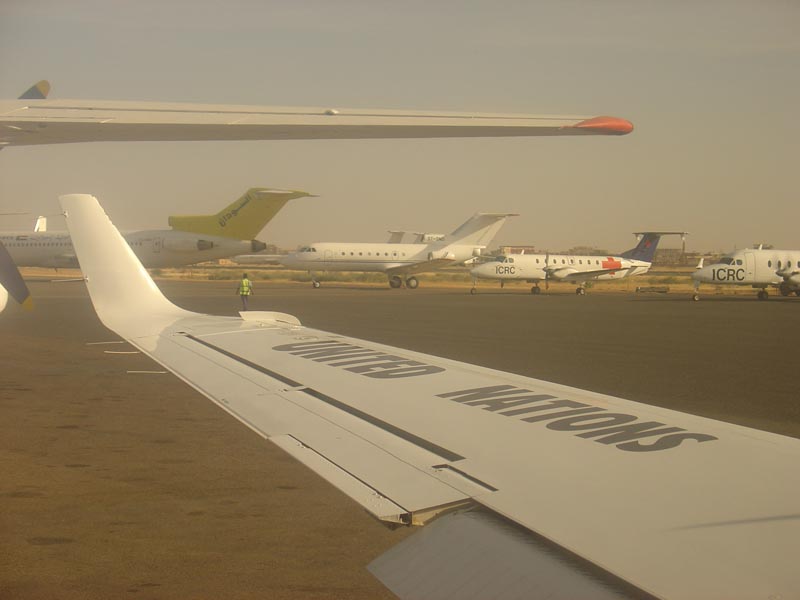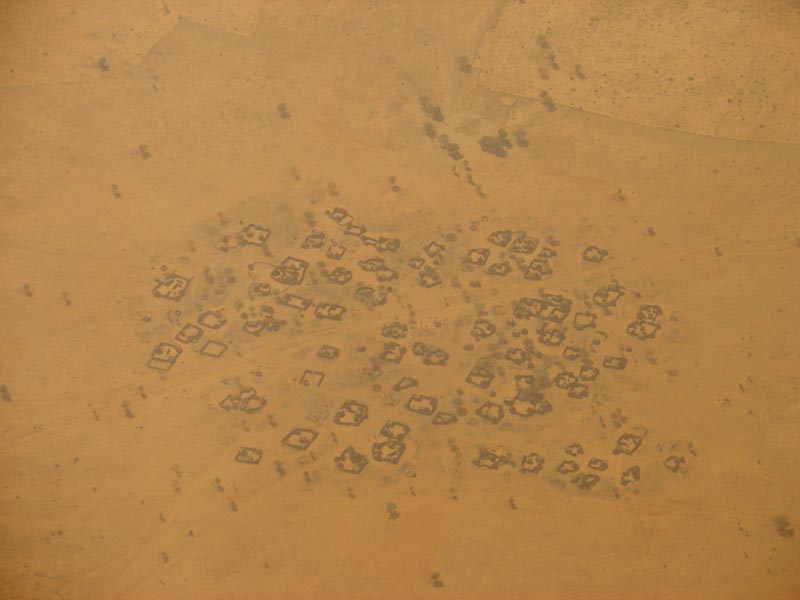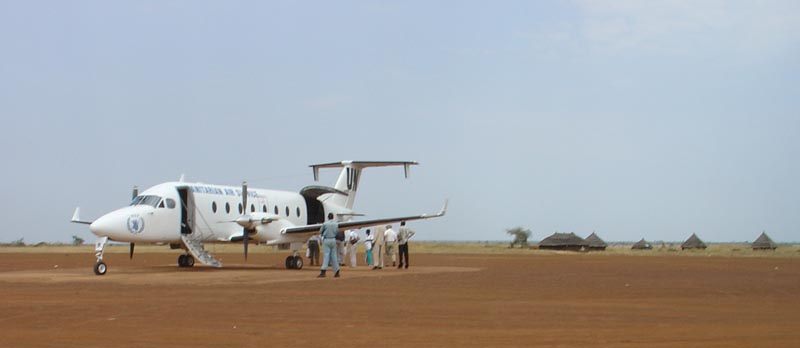|
Sun 14 Nov
It was early morning at the domestic terminal of Khartoum Airport. A 7:00am check-in for four flights. The hall was full. Why do they do this?I noticed our flight passenger list ran to six or seven people so it seemed a coincidence to me that in the crowded waiting area Eleanor and I sat down next to two of them. One was a large Swiss guy who looked as if the only exercise he got was turning a steering wheel. We discussed the advertised route and he assured us, as a regular, that we would go to his airfield first. He was smoking and sneering. Not much was right in his world. It may have been his accent, pronunciation or command of English language but his manner was aggressive; he was a Big Fat Grump. The other passenger, a black man, listened and laughed along with our conversation. The BFG asked which tribe he was from and the man explained in quite natural English that actually he was from Sierra Leone and he had been working in various countries for the UN; he had just been posted here in Sudan. The BFG exhaled, and spat, and looked the other way. "That business going on in Ivory Coast, it's a [expletive] disgrace. Those expatriates who've lived there for generations, born there, houses, property, have to leave with a few hours notice." It was as if it was all the personal fault of our acquaintance from a neighbouring but unrelated country. Eleanor was keen to have another cigarette. She joked with the BFG that it would be her last one for a while as when she got to Kadugli she would most likely stay with a family. "Oh it's not a family station – Kadugli. I had to get special permission for my wife to stay there." Eleanor clarified: she meant a "local" family. "It's OK, you can smoke. They will just have to learn that other people do things differently."
 |
| Commuter flights, Khartoum |
|
|
|
|
 |
| Simple village settlement |
|
|
|
After the Chinese oil-workers' flight had gone we were down to about 50, mostly westerners, mostly going to Darfur. At about 8:00am we all shared the one airport bus to take us out on to the tarmac. A tall, thin man, I assumed to be about 55 years old, told me he was working for US AID. This was his first visit to Sudan though he had plenty of "field experience" elsewhere. He was looking forward to it but didn't really know what to expect; he wore ironed blue jeans with a mobile phone clipped to his belt and polished city shoes. On the tarmac we were greeted by our pilots: Rob and Fleur, stood next to their gleaming white Raytheon Beechcraft 1900. It had "Humanitarian Air Services" painted down the fuselage and "United Nations" on the wings. (I wondered how many planes the UN operate around the world; could be one of the largest fleets?) We identified our baggage and boarded. The cabin was new but plain. The leather seats were arranged one either side of a central aisle in nine rows. Curiously they were labelled A and F; everyone gets a window seat (and an aisle). Rob gave us the safety briefing personally (rather than over a loudspeaker system) while Fleur hauled-in the steps, shut the door, and got the engines going. There was no cabin crew, and no in-flight catering. We had great views of Khartoum and the White Nile down to the Sinar Dam and then headed west over sandy plains reaching El Obied in just 50 minutes. (It takes seven hours by luxury express coach.) El Obied International seemed to be a base for the UN World Food Programme (WFP). I suspect they built the airport to support their needs. There were several huge cargo planes on the tarmac and warehouses nearby, I assumed to be food stores. We had stopped to refuel and took on a Roman Catholic priest.
 |
| Our plane at Wau, Southern Sudan |
|
|
The next hop was 1½ hours south to Wau ("wow"), frustrating for those wanting Kadugli, which we flew over after 30 minutes, but the bonus for newcomers was a chance to see something of southern Sudan. It was noticeably more green and hilly than the north. There were many rivers and water courses, and from time to time we would realise that great areas of land were actually under water. The air strip at Wau was of dirt and the building of wood. Across the runway were some thatched African mud huts and next door were a couple of large cargo planes that had clearly made their last fights long ago. Though probably cooler than Khartoum, the humidity made the air stuffy and sticky. Eventually we arrived in Kadugli. I should not have been surprised to see white, UN Land Cruisers waiting on the tarmac. But I was for some reason; perhaps it was because there were four of them in such a remote place? One collected the guy from Sierra Leone. Another was the BFG's wife and house-boy. She backed the UN Land Cruiser up to the hold of the plane so that his oversized cool box did not need to be carried too far. Unsurprisingly, whatever had been arranged for us had not materialised. It was Eid after all, and the mobile phone network was not working. We looked helpless and gratefully accepted BFG's offer of a lift into town, and the invitation to stay in their guest accommodation, and later in the evening, even more gratefully, we accepted glasses of Chianti. Thank goodness for the Big Friendly Giant.
|